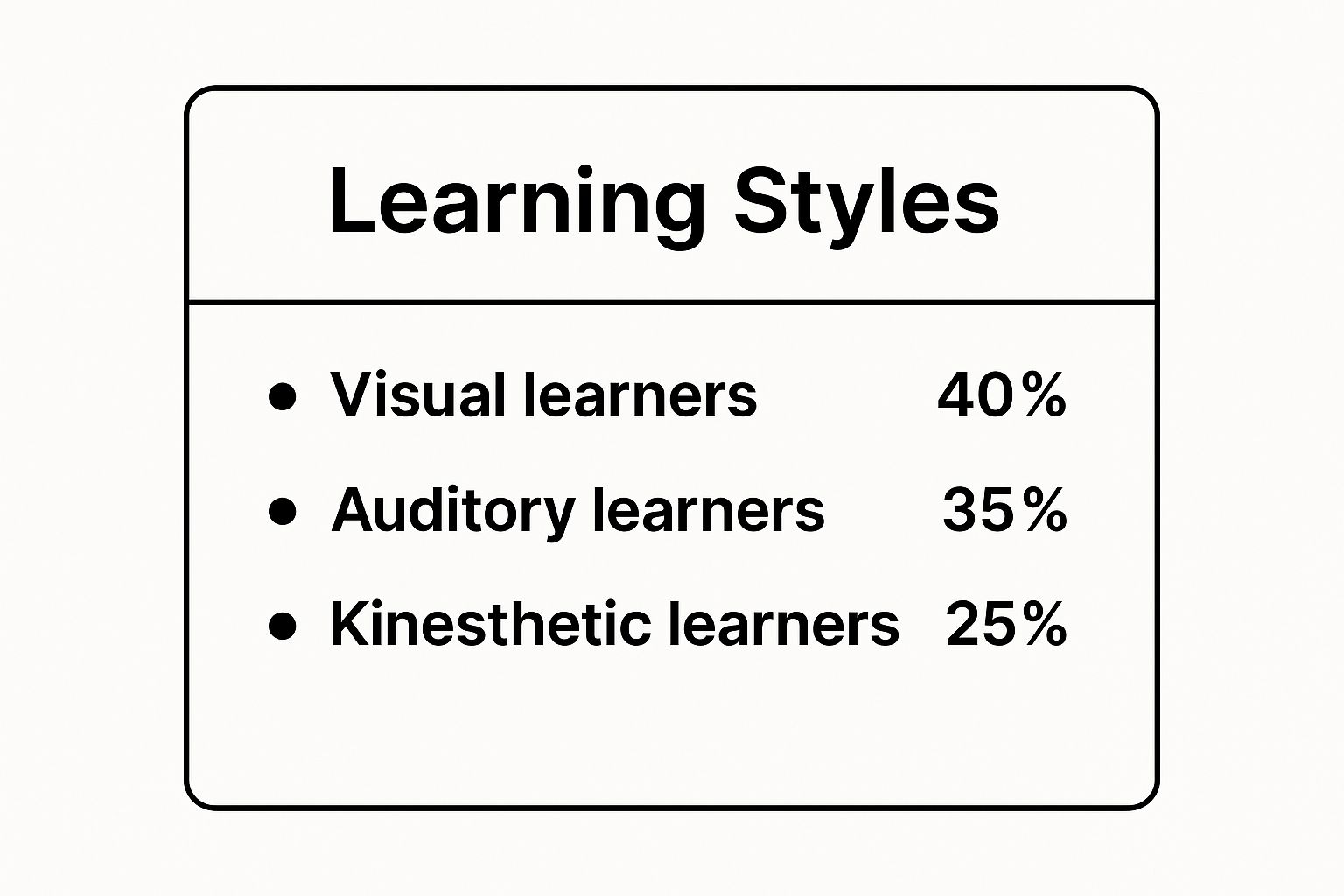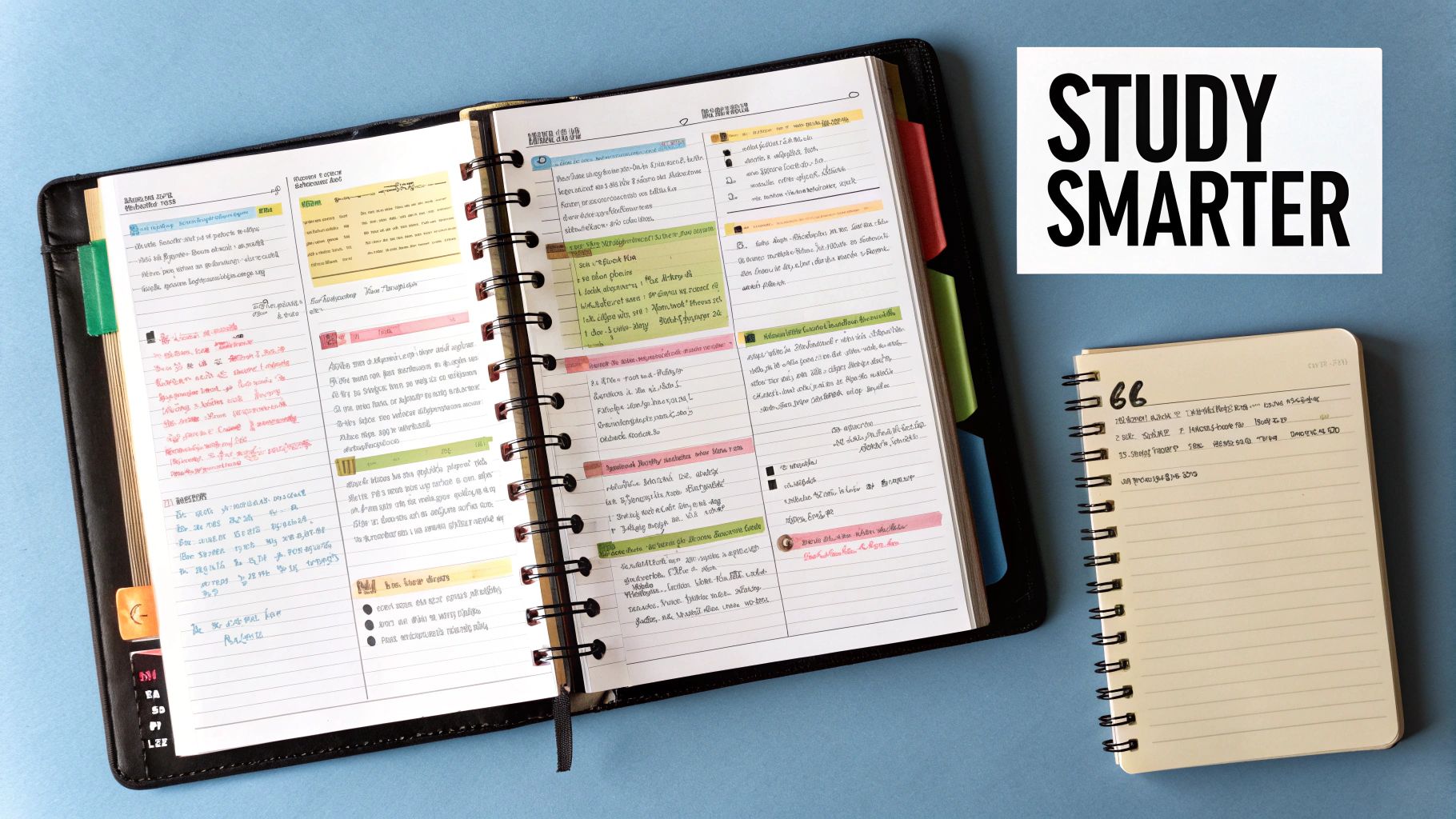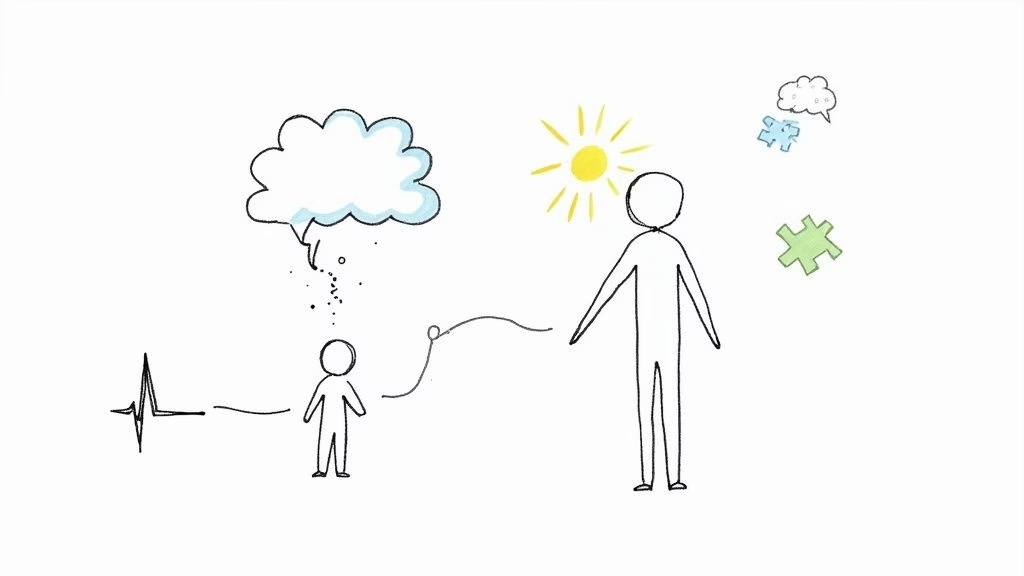To really improve your grades, it’s not just about hitting the books harder. It’s about building a solid partnership with your parents and teachers—one focused on smart habits, open communication, and your own well-being. This whole process is a mix of shifting your mindset, finding study methods that actually work for you, and paying attention to your mental health.
When you break it down like that, the goal of improving academically feels much more manageable and less like a solo mission.
Your Foundation for Better Grades
So, you’re wondering how to improve your grades? The journey doesn’t start with pulling all-nighters or last-minute cramming sessions. Trust me, that’s a recipe for burnout. Instead, it’s built on a foundation of understanding yourself, your environment, and the resources you have at your fingertips.
For both teens and parents, watching grades drop can feel overwhelming. But breaking it down into three key areas—your mindset, your methods, and your mental health—makes the path forward much clearer.
This isn't about trying harder; it’s about working smarter. It all starts with realizing that procrastination and a lack of motivation are often just symptoms, not the root problem. They can be signals of underlying stress, anxiety, or a disconnect between how you're being taught and how your brain actually learns. This is where parents can make a huge difference—shifting the conversation away from just grades and toward well-being can uncover the real barriers.
Understanding How You Learn and What Motivates You
Every student's brain processes information a little differently. Some people need to see things, others need to hear them, and some need to physically do something to make it stick.

This image just confirms what many of us feel: a one-size-fits-all approach to studying is bound to fail. When you tailor your study methods to your own learning style, you’re setting yourself up for a much better outcome.
This idea is backed up by what students and parents are saying, too. When students feel like their school environment is supportive, their grades tend to get better. In fact, a 2025 survey showed that 71% of K-12 students gave their schools an A or B grade—a real jump from previous years. This positivity is directly linked to higher GPAs, suggesting that a collaborative school climate is a key ingredient for academic success. You can check out the full survey data about student perceptions and grades on Gallup.com.
The Role of Mental Health and Support
Your mental state is directly tied to your ability to focus, learn, and stay motivated. It’s no surprise that when stress, anxiety, or just feeling overwhelmed take over, grades are often the first casualty. Research consistently shows a strong link between adolescent mental health and academic performance. For teens, knowing where to turn for help is everything. Organizations like The JED Foundation offer resources specifically designed to help young people navigate these exact challenges.
A supportive home environment where you feel safe talking about your struggles without judgment is non-negotiable. Parents can create this by focusing on your effort and well-being, not just the letter on the report card.
This initial phase is all about building a strong support system. By understanding how you learn, leaning into a positive school environment, and making mental health a priority, you and your parents can create a solid foundation to build better grades on.
To get started, here is a quick overview of the key strategies and how they can help both students and parents work together.
Core Strategies for Academic Improvement
| Strategy Area | Key Actions for Students | Parenting Tip | Expected Outcome |
|---|---|---|---|
| Mindset | Shift focus from "I can't" to "How can I?" | Celebrate effort and progress, not just grades. | Increased resilience and motivation. |
| Methods | Identify your learning style and adapt study habits. | Help find resources that match their learning style. | More effective and efficient studying. |
| Mental Health | Acknowledge stress and seek support when needed. | Keep communication open and judgment-free. | Better focus and reduced academic anxiety. |
| Collaboration | Talk to teachers about struggles and ask for help. | Foster a collaborative relationship with teachers. | A stronger support network and clearer path to success. |
These core areas are the building blocks. By focusing on them together, improving grades becomes a team effort rather than a source of conflict. It sets the stage for meaningful, long-term success that goes far beyond a single test score.
Mastering Your Mindset to Beat Procrastination

Let's be real. The biggest walls you hit when trying to improve your grades usually aren't about the subject matter. They’re mental.
It's that constant pull to put things off, that crushing feeling of being overwhelmed, and that nagging voice in your head saying, "I'm just bad at this." These are powerful forces, and they can wreck even the best intentions. A lack of motivation for school is often tied to procrastination. If you want to take back control, you first have to understand what's happening in your own head.
I see it all the time. A big paper is due, the anxiety starts to creep in, and suddenly, reorganizing your sock drawer feels like the most urgent task in the world. This isn’t a character flaw or laziness; it's a completely normal response to stress. Your brain is desperately seeking a quick mood boost by avoiding the thing that’s making it uncomfortable. The only problem? That relief is temporary and almost always leads to more stress down the road.
From a Fixed Mindset to a Growth Mindset
Here's where it gets interesting. Your belief about your own abilities has a huge impact on how you handle challenges.
A fixed mindset is the belief that your talents are set in stone. You're either a "math person" or you're not. End of story. This view makes any challenge feel like a threat because if you fail, it feels like a final verdict on your intelligence. It's a quick path to just giving up.
On the flip side, a growth mindset is the understanding that you can develop your abilities through hard work and dedication. When you see challenges as opportunities to get better, failure is just a lesson, not a judgment. This simple shift in perspective is everything when it comes to building resilience.
Adopting a growth mindset changes your entire relationship with school. Instead of dodging hard subjects, you start asking, "What strategy haven't I tried yet?" This puts you back in the driver's seat of your own education.
This isn't an overnight fix. It's a practice. It starts with catching that internal voice. When you think, "I can't do this," you reframe it: "I can't do this yet, but I can figure it out."
Practical Tools to Break the Procrastination Cycle
Knowing you should change your mindset is one thing. Actually doing it is another. Procrastination loves to feed on that feeling of being overwhelmed. The secret is to make tasks feel so small that you can’t say no.
Here are two of my favorite techniques:
- The Two-Minute Rule: If a task takes less than two minutes, do it now. No excuses. For bigger projects, the rule is to just start and work on it for only two minutes. The idea of writing a five-page essay is terrifying. But writing for 120 seconds? Anyone can do that. The hardest part is almost always getting started, and this little trick gets you over that first hump.
- The Pomodoro Technique: This is a game-changer for focus. You use a timer to break your work into focused sprints, usually 25 minutes, followed by a short break. It’s designed to fight mental burnout and keep you sharp. You work with total intensity for a short burst, then give your brain a rest. It makes a long study session feel less like an endless marathon.
Learning how to stop procrastinating is a skill that pays off long after you've left the classroom.
Parenting Tips for Fostering a Healthy Mindset
Parents, you have a huge role to play here. The goal is to be a supportive coach, not another source of pressure.
Try focusing on the process, not just the final grade. Instead of asking, "What did you get on the test?" try asking, "What did you learn while studying for it?" or "What was the toughest part of that project?" This simple switch shows you value their effort and grit, not just a number on a report card.
Praise their strategies and their persistence. A comment like, "I saw how hard you worked on that problem and you found a totally new way to solve it!" is far more powerful than a generic "You're so smart." It reinforces that their effort—not some innate talent—is what leads to success. This creates a safe space where your teen feels supported, not judged, which is essential for their academic progress and their well-being.
Building Smarter Study and Organization Habits

Once you've started shifting your mindset, the next step is building the practical habits that actually make better grades happen. This isn't about finding more hours in the day. It’s about making the hours you already have count.
We’ve all been there—the late-night cram session fueled by caffeine and desperation. It might get you through a single test, but it doesn't build real understanding or confidence for the long haul. Working smarter starts with ditching those old habits for proven study methods and a solid organizational system.
This means going way beyond just rereading your notes until your eyes glaze over. Real learning happens when your brain has to actively work to pull out information. A technique I’ve seen work wonders is active recall, where you force yourself to remember information without looking. Think flashcards, or even just explaining a concept out loud to an empty room. It feels harder, and that's the point. It’s like doing reps at the gym, but for your memory.
Another game-changer is spaced repetition. Instead of cramming for a history test all night, you review key dates for 15 minutes on Monday, another 15 on Wednesday, and a final 15 on Friday. This approach works with your brain's natural tendency to forget, interrupting the process and locking the information into your long-term memory.
Creating a System That Works for You
A good study plan is more than a to-do list; it’s a roadmap for your week that balances school, sports, social time, and rest. This is where a planner—digital or paper—becomes your best friend. The trick is to schedule not just what you'll study, but when and for how long.
- Block out the non-negotiables first. This means class time, sports practice, family dinners, and, yes, sleep.
- Get specific with your study blocks. Don’t just write "study." Instead, write "Review Chapter 4 of biology for 45 minutes."
- Schedule your breaks. Your brain needs downtime. Short, planned breaks actually prevent burnout and help you stay sharp during your study sessions.
The goal here is to build a predictable routine. When you create a system you can rely on, you spend less mental energy fighting the urge to procrastinate and more energy actually getting things done.
This kind of structured approach does more than just help with homework. Research is increasingly showing how outside factors, like mental health and technology, affect academic performance globally. By creating organized habits, you're better equipped to manage those pressures. You can dive deeper into these trends in the 2025 Global Student Experience Report.
Parenting Tips for Fostering Organization
Parents, your role here is to be a guide, not a drill sergeant. The whole point is to help your teen take ownership of their own work and schedule.
A great place to start is by creating a dedicated study space together. It doesn’t have to be a fancy home office—just a quiet, organized spot that’s free from the usual distractions. Good lighting and all the necessary supplies send a clear signal: this is a place where focused work happens.
You can also model these skills yourself. Talk through how you plan your own week or organize a big project at work. When you help them set up their planner, ask guiding questions like, "How much time do you think that history project will really take?" This gets them thinking ahead and learning to manage their own time—a skill that’s crucial for improving grades and for life after high school.
The Critical Role of Mental Health in School
If you’ve tried every study trick in the book, reorganized your binders a dozen times, and still feel like you’re hitting a wall, it might be time to look at what’s going on inside. It's easy to get laser-focused on grades, but we often miss the real story: the undeniable link between mental health and how you perform in school.
What might look like laziness or a bad case of procrastination is often something else entirely. It could be stress, anxiety, or just plain burnout. The pressure to keep up, piled on top of social life and a schedule packed to the brim, can create a perfect storm. When your mental battery is running on empty, trying to focus in class or crank out homework can feel impossible. The truth is, learning how to get better grades often starts with learning how to take care of yourself.
From Overwhelmed to In Control
The goal isn't to get rid of stress completely—that’s not realistic. It's about building the skills to handle it without letting it run the show. You’d be surprised how much of a difference a few small, consistent habits can make.
- Mindfulness and Breathing: The next time you feel that wave of anxiety rising before a test, try this. It’s called "box breathing." Inhale for four seconds, hold your breath for four, exhale for four, and hold again for four. Just a minute or two of this can calm your nervous system right down and bring back your focus.
- The Power of Sleep and Movement: Never, ever underestimate a good night's sleep. Study after study confirms that being sleep-deprived absolutely tanks your memory, focus, and ability to manage your emotions. In the same way, getting your body moving—even just a 20-minute walk outside—can be a game-changer for your mood and mental clarity.
Your mental health is the foundation that all your academic success is built on. Taking care of it isn’t selfish or a distraction—it's the most strategic move you can make for your grades and your life.
Finding Trusted Resources and Support
Figuring out that you need support is a sign of strength, not weakness. The good news is there are some incredible organizations out there dedicated to helping teens navigate this stuff, offering confidential help and real-world information.
Groups like The JED Foundation and The Trevor Project are all about creating safe spaces and providing tools that actually work for the challenges you’re facing.
Here are a few you can trust:
- The JED Foundation: This is a great place to start for expert advice and resources on managing your emotional health and dealing with life's curveballs.
- The Trevor Project: They offer crisis intervention and suicide prevention services specifically for LGBTQ young people under 25.
- Teen Mental Health.org: Their whole goal is to share science-based information to help young people understand and improve their mental health.
A Parenting Tip: Talking About Mental Health
Parents, this is where you play a huge role. The trick is to open the door to a conversation that feels compassionate and free of judgment. Instead of jumping straight to questions about grades, try something softer. "How have you been feeling lately?" or "I've noticed you seem stressed; is there anything you want to talk about?"
Your main job is to create a safe space for these talks to happen. If you're looking for more guidance, our article on how to improve teen communication skills with these key strategies has some really practical tips. And if you notice ongoing changes in their behavior—like withdrawing from friends, being more irritable, or shifts in sleep or appetite—it might be the right time to get professional support from a therapist or counselor.
Supportive Parenting Strategies for Teen Success

When your teen's grades start to slip, the first instinct is often to jump in and take control. I get it. You want to fix things. But stepping in as their full-time academic manager can backfire, creating more tension than it solves.
The real key is to shift your role from manager to coach. It’s a subtle but powerful change that helps build their independence and creates a foundation of trust. That trust is absolutely essential for their long-term success.
This means changing the entire conversation. Instead of zeroing in on a missing assignment or a single bad test score, try to see the bigger picture. A good talk isn't about placing blame; it's about working together to find a path forward. This approach empowers your teen to actually own their academic journey, all while knowing you’re their biggest supporter.
From Manager to Coach
A manager directs. A coach guides. This is one of the most important transitions you can make as a parent, and it’s critical for your teen’s development.
As a coach, your job is to help them pinpoint their own roadblocks. Is it procrastination? Anxiety? A total lack of organization? Once you know the real issue, you can brainstorm solutions together. This builds their problem-solving skills for life.
For instance, instead of demanding they get their homework done, you could ask, "What’s one small thing you could do right now to make that huge project feel less overwhelming?" A simple change in language can make all the difference. For more ideas on this approach, check out these coaching tools for enhancing teen engagement in school.
The ultimate goal is to build your teen’s confidence in their own ability to handle challenges. When they feel capable, their motivation to improve their grades will follow naturally.
Addressing Procrastination and Mental Health
A lot of the time, a dip in academic performance is just a symptom of something deeper. Procrastination and a lack of motivation can be flashing red lights for anxiety, stress, or just feeling completely overwhelmed. It's so important to see the connection between their mental well-being and their schoolwork.
- Open the Door for Conversation: You have to create a safe, judgment-free space for your teen to talk about what's going on inside. Sometimes a simple, "You've seemed a little stressed lately, how are you feeling?" is all it takes to start a real dialogue.
- Know When to Seek Help: If you have a gut feeling that your teen is dealing with more than just typical school stress, don't wait. It's okay to seek professional support.
Looking at these underlying issues is a huge first step. It's also worth remembering that bigger, systemic problems can play a role. The achievement gap, which has only gotten wider since the pandemic, puts extra pressure on students from all sorts of backgrounds. Addressing these educational inequities is part of helping every student find their footing and reach their full potential.
Got Questions? I’ve Got Answers
Navigating the path to better grades always brings up a few common hurdles. Whether you're a student feeling stuck or a parent trying to help, let's tackle some of the most frequent questions I hear.
My Grades Suddenly Dropped. What’s The First Thing I Should Do?
When your grades take an unexpected nosedive, the first move is to talk to that teacher. Seriously. They can immediately point out what’s going on—maybe it's a few missing assignments or one specific concept that just isn't clicking. This gives you a clear, actionable starting point.
After that, have a real conversation with a parent, guardian, or your school counselor. A sudden drop isn't always about the subject matter. It can be a sign of stress, social drama, or just feeling completely overwhelmed. Getting to the root of it with a trusted adult is the only way to fix the real problem.
How Can I Motivate Myself For Subjects I Find Boring?
It’s almost impossible to get excited about a subject that just doesn’t spark your interest. I get it. A great strategy is to find a way to connect the material to something you actually enjoy. If history class is a total drag, try finding an awesome documentary or even a movie about that time period to make it feel more alive.
Another trick that works wonders is a simple reward system.
- Commit to tackling the boring subject for a focused chunk of time, say 45 minutes.
- When the timer goes off, reward yourself with 15 minutes of something you actually want to do—play a game, listen to music, or scroll through social media.
This approach breaks the work into manageable sprints and gives your brain a little something positive to look forward to. It makes getting started so much easier.
How Can I Help My Teen Without Constantly Nagging About Grades?
For parents, this is a big one. The key is to shift the entire conversation from grades to effort and well-being. This simple change can transform the dynamic from a confrontation into a supportive partnership.
Instead of asking, "What's your math grade?" try something more open-ended like, "How did that math test feel?" or "What are you guys covering in history this week?" This opens the door for a real conversation, not just a one-word answer.
Offer your support without being pushy. Say things like, "I'm here if you want to run through your notes together," or "Let me know if you need help finding a quiet spot to study." When you praise them for sticking with a tough project or studying consistently—no matter the final grade—you show that you value their resilience, not just the number on a report card. That's how you build trust and show you're on their team.
Feeling overwhelmed by all this is normal, but you don’t have to figure it out alone. At Andrew Petrillo Life Coaching, I specialize in helping teens and young adults move past academic hurdles by building the confidence, motivation, and practical skills they need to succeed.
If you're ready to turn that feeling of being stuck into real, forward action, you can learn more and book a complimentary discovery call on my site.



















